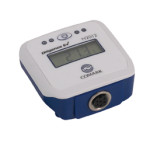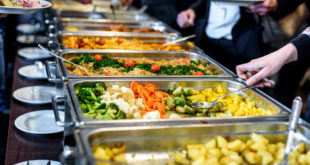As the past year’s worth of food contamination scares have shown, managing food safety must be a top priority for the food service industry. In fact, it can mean the survival or failure of your business, since a foodborne illness case linked to your restaurant or commercial kitchen could put you out of business with sickening speed. The good news is there are many ways to apply technology to the timeless problem of managing temperature, and data loggers from companies like Comark are a major part of the 21st century approach to managing food safety.

A data logger is a small (they usually fit in the palm of your hand) digital device capable of taking regular air temperature and humidity readings in a walk-in refrigerator or freezer. This allows you to accurately record average food temperatures on a consistent basis and keep a log of temperature patterns over time.
Many data loggers even have an optional probe that can be inserted into cooling product to make sure it is getting out of the temperature danger zone quickly. Multiple probes can be linked to a single logger through a link box system, allowing you to track temperatures in several types of product simultaneously.
Data loggers have incredible memory capabilities, with many able to record tens of thousands of temperature readings. Even more useful to managers is accompanying software and a USB cable that enables data to be transferred from the logger to a PC, where it can be stored and analyzed.
Why are data loggers so important?
Besides the obvious ability to constantly monitor temperature in your commercial kitchen, a good data logging system will help you during your next health inspection.
Having cool time data for stored product and average walk-in temperatures at your fingertips means you can quantify for the inspector exactly how your food safety program is keeping product out of the temperature danger zone.
You’ll also be able to identify and head off problems before they become issues with the inspector. If product isn’t cooling down fast enough or your walk-in isn’t staying cold enough, a data logger can tell very quickly.
Tracking temperature changes can also save you money. If the data shows your walk-in’s temperature rises at the same time every day, it’s that much easier to identify the cause of the problem.
Maybe an employee leaves the door open to pull product every morning. Perhaps the door gasket needs to be replaced. Knowing temperature trends means you can devise ways to improve energy efficiency and save on the bills in the process.
It’s said “knowledge is power,” and having a data logger working for your restaurant or commercial kitchen is definitely a powerful way to manage food temperature. And as recent events have shown, you can’t afford to ignore this very important issue.
 Corner Booth Blog | TundraFMP Restaurant Supply, News & Equipment Blog
Corner Booth Blog | TundraFMP Restaurant Supply, News & Equipment Blog




These are FANTASTIC devises! I would suggest you get the probe and measure actual product temperature. The air temperature can vary a lot and not necessarily effect the food temperature.
Also remember, any freezer unit will have a defrost cycle that will raise air temperature but not high enough to effect food temperature.
This devise will also help your maintenance tech. diagnose any problem you are having with your cooler should you have a service call.
Kevin Loving
Galveston Texas (Where we often spend some quality time in the cooler so we can understand what cold feels like!)
Data loggers are not only great for commercial kithens and restaurants, but also are highly useful for transit, processing, pharmaceutical and industrial applications. Every week or every month-upload the data report to an Excel file for permanent HACCP temperature documentation.